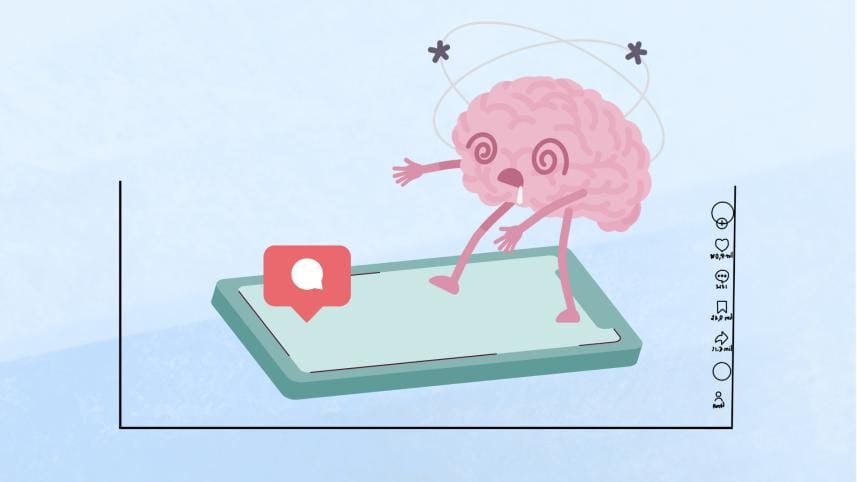Beating brainrot in Dhaka

The clock strikes 10:15 as I sit down to write with my cup of honey-infused chaa. The downpour of July is coming down incessantly, and I have piles of work yet to be finished. Yet—without much thought—I unlock my phone at the ring of a notification. Ninety minutes later, I'm knee-deep in Facebook reels about AI cats saving the world, while a self-help podcast pointlessly plays on my laptop.
Of course, this isn't just procrastination anymore. It's something way more insidious, and it's like my wits are eroding away. The internet, as it turns out, has had brainrot for a while.
Brainrot essentially describes the withering of mental faculties from overexposure to low-value digital content. Your attention span frays, while even your capacity for joy seems to dull down.
A 2023 study published in Nature Human Behaviour found that excessive screen time correlates with reduced grey matter density in the prefrontal cortex, the region that governs focus and impulse control. Meanwhile, global surveys show people now spend an average of 6 hours and 58 minutes per day online. In Bangladesh, a 2024 BTRC report noted a 12 percent year-on-year increase in mobile internet usage, with urban youth being the heaviest consumers.
In Dhaka, where the air itself sometimes feels combustible, it's almost impossible to resist.
Life here is overstimulating in all the wrong ways. The relentless clamour of traffic, the heat that clings like a second skin, the political uncertainty that bubbles under every conversation— I know I've heard the word 'doshor' more than I need to in a lifetime.
Our brains crave escape. So, we scroll and scroll. Each swipe delivers a hit of dopamine, reinforcing the loop. Researchers at Stanford call this the "variable reward system," likening it to the psychological mechanisms of slot machines.
For a creative—or anyone trying to do deep, meaningful work—this is fatal. My to-do lists lie dormant as I drift through timelines, simultaneously overstimulated and numb.
I don't pretend to have mastered this. But I've begun stitching together a ragged arsenal of countermeasures—small rituals and habits that, together, feel like resistance.
One powerful approach is dopamine fasting, which involves imposing strict device curfews. Think of it as a digital detox for specific hours of the day. Initially, the absence of screens might feel disorienting, even leading to "phantom vibrations" and a sense of loss, as one might expect from a habitual behaviour suddenly halted. However, as a University of Pennsylvania study revealed, even short social media breaks can significantly reduce depressive symptoms by as much as 36 percent. The initial discomfort soon gives way to a profound sense of relief, a liberation from the constant digital hum.
Overcoming procrastination, especially with tasks like writing, can be tackled with the five-minute rule. The premise is simple: commit to just five minutes of work. What often happens, thanks to what psychologists call the Zeigarnik effect—our brain's natural aversion to unfinished tasks—is that those five minutes stretch into fifty, or even more. It's a clever trick to bypass the initial resistance and tap into our innate drive for completion.
Beyond dedicated breaks, digital hygiene is essential for maintaining sustained focus. This involves a series of small, intentional frictions to make mindless scrolling less appealing. Disabling non-essential notifications, removing distracting apps like Instagram from the home screen, and using browser extensions to block time-wasting websites are all effective tactics. I personally found disabling notification sounds on Facebook very useful.
Reclaiming the body is another vital element in this pursuit of mental clarity. The connection between physical movement and a clear mind is well-established; monks, for instance, have long practised meditative walks. A meta-analysis in The British Journal of Sports Medicine highlights that even a mere 20 minutes of walking can improve executive function. While navigating the chaos of a city like Dhaka for a walk might seem daunting, even simple pacing within an apartment can offer similar benefits, helping to clear the mind and reduce mental clutter.
Creating micro-sanctuaries within our living spaces can also be transformative. While it is difficult in the micro-apartments in Dhaka, designating a "focus corner"—a space devoid of devices, perhaps with just a comfortable chair and a plant—can provide a haven where the air feels lighter and you can hope to suspend your disbelief of being in an AQI nightmare.
It's important to remember that progress in escaping brainrot isn't linear. There will be days when the lure of scrolling proves too strong, pulling us back into the digital quicksand. However, practising self-compassion instead of self-criticism is key. Studies consistently show that a gentle, understanding approach to oneself is a far more effective motivator than harsh self-judgment. The goal isn't perfection, but rather a continuous effort to reclaim small pockets of space, silence, and sovereignty over our own attention.
This pursuit is more than just about boosting productivity, although a 2024 survey revealed that 42 percent of young professionals worldwide felt digital distraction was severely harming their careers. Ultimately, it's about preserving ourselves. Creativity, deep thought, and genuine self-reflection require boredom, downtime, and even a touch of discomfort—precisely the things our perpetually connected devices tend to ignore. By consciously resisting and nurturing our ability to simply sit in silence, to grapple with a blank page and wrestle a thought into words, we can begin to remember what it truly feels like to have a mind that is our own. Here's to actually living, no matter how far we've been knocked into internet obscurity.




 For all latest news, follow The Daily Star's Google News channel.
For all latest news, follow The Daily Star's Google News channel.
Comments